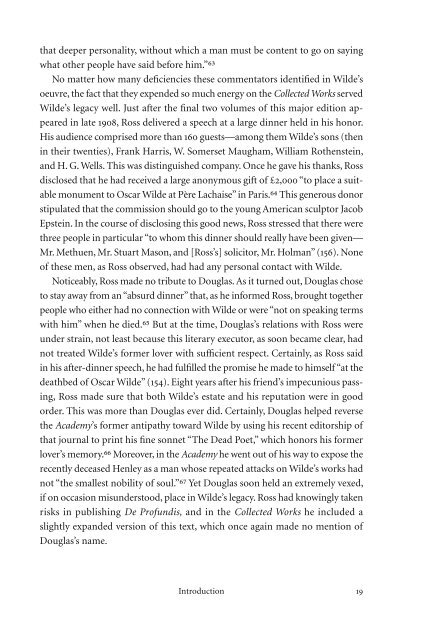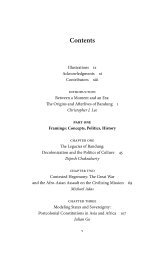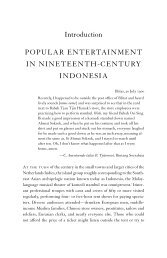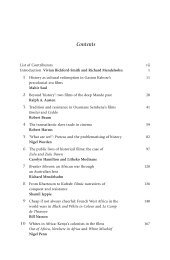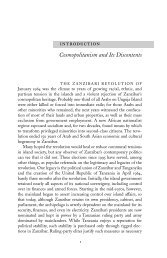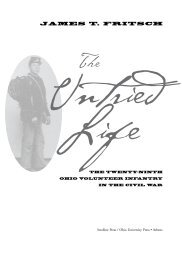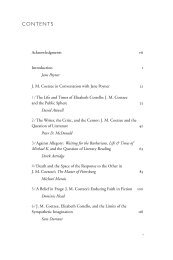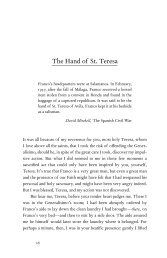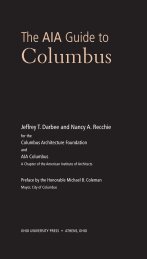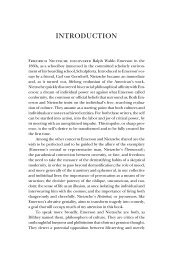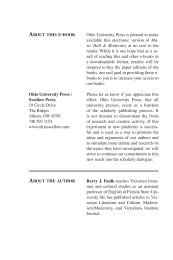Oscar Wilde and Modern Culture - Ohio University Press & Swallow ...
Oscar Wilde and Modern Culture - Ohio University Press & Swallow ...
Oscar Wilde and Modern Culture - Ohio University Press & Swallow ...
You also want an ePaper? Increase the reach of your titles
YUMPU automatically turns print PDFs into web optimized ePapers that Google loves.
that deeper personality, without which a man must be content to go on saying<br />
what other people have said before him.”₆³<br />
No matter how many deficiencies these commentators identified in <strong>Wilde</strong>’s<br />
oeuvre, the fact that they expended so much energy on the Collected Works served<br />
<strong>Wilde</strong>’s legacy well. Just after the final two volumes of this major edition appeared<br />
in late 1908, Ross delivered a speech at a large dinner held in his honor.<br />
His audience comprised more than 160 guests—among them <strong>Wilde</strong>’s sons (then<br />
in their twenties), Frank Harris, W. Somerset Maugham, William Rothenstein,<br />
<strong>and</strong> H. G. Wells. This was distinguished company. Once he gave his thanks, Ross<br />
disclosed that he had received a large anonymous gift of £2,000 “to place a suitable<br />
monument to <strong>Oscar</strong> <strong>Wilde</strong> at Père Lachaise” in Paris.₆⁴ This generous donor<br />
stipulated that the commission should go to the young American sculptor Jacob<br />
Epstein. In the course of disclosing this good news, Ross stressed that there were<br />
three people in particular “to whom this dinner should really have been given—<br />
Mr. Methuen, Mr. Stuart Mason, <strong>and</strong> [Ross’s] solicitor, Mr. Holman” (156). None<br />
of these men, as Ross observed, had had any personal contact with <strong>Wilde</strong>.<br />
Noticeably, Ross made no tribute to Douglas. As it turned out, Douglas chose<br />
to stay away from an “absurd dinner” that, as he informed Ross, brought together<br />
people who either had no connection with <strong>Wilde</strong> or were “not on speaking terms<br />
with him” when he died.₆₅ But at the time, Douglas’s relations with Ross were<br />
under strain, not least because this literary executor, as soon became clear, had<br />
not treated <strong>Wilde</strong>’s former lover with sufficient respect. Certainly, as Ross said<br />
in his after-dinner speech, he had fulfilled the promise he made to himself “at the<br />
deathbed of <strong>Oscar</strong> <strong>Wilde</strong>” (154). Eight years after his friend’s impecunious passing,<br />
Ross made sure that both <strong>Wilde</strong>’s estate <strong>and</strong> his reputation were in good<br />
order. This was more than Douglas ever did. Certainly, Douglas helped reverse<br />
the Academy’s former antipathy toward <strong>Wilde</strong> by using his recent editorship of<br />
that journal to print his fine sonnet “The Dead Poet,” which honors his former<br />
lover’s memory.₆₆ Moreover, in the Academy he went out of his way to expose the<br />
recently deceased Henley as a man whose repeated attacks on <strong>Wilde</strong>’s works had<br />
not “the smallest nobility of soul.”₆⁷ Yet Douglas soon held an extremely vexed,<br />
if on occasion misunderstood, place in <strong>Wilde</strong>’s legacy. Ross had knowingly taken<br />
risks in publishing De Profundis, <strong>and</strong> in the Collected Works he included a<br />
slightly exp<strong>and</strong>ed version of this text, which once again made no mention of<br />
Douglas’s name.<br />
Introduction 19


